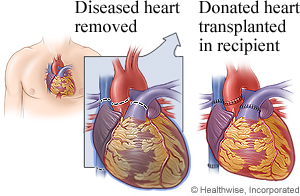
What is heart transplant surgery?
A heart transplant is surgery to take out a diseased heart and replace it with a donor heart.
The doctor will make a cut in the skin over your breastbone (sternum). The cut is called an incision. Then the doctor will cut through your sternum to reach your heart. The doctor will connect you to a heart-lung bypass machine. It adds oxygen to your blood and moves the blood through your body. This machine will allow the doctor to stop your heartbeat. The doctor replaces the diseased heart with a healthy heart.
The doctor may use wire to put your sternum back together. Stitches or staples are used to close the incisions in the skin over your sternum. The wire will stay in your chest. The incisions will leave scars. But the scars may fade with time.
You may spend about 1 to 2 weeks in the hospital after surgery. You may have to stay longer. This depends on your health and if you have problems from surgery.
You will likely start a cardiac rehabilitation (rehab) program in the hospital. You will continue with this rehab program after you go home to help you recover and prevent problems with your heart.
How do you prepare for surgery?
Surgery can be stressful. This information will help you understand what you can expect. And it will help you safely prepare for surgery.
 Preparing for surgery
Preparing for surgery
- Be sure you have someone to take you home. Anesthesia and pain medicine will make it unsafe for you to drive or get home on your own.
- Understand exactly what surgery is planned, along with the risks, benefits, and other options.
- If you take a medicine that prevents blood clots, your doctor may tell you to stop taking it before your surgery. Or your doctor may tell you to keep taking it. (These medicines include aspirin and other blood thinners.) Make sure that you understand exactly what your doctor wants you to do.
- Tell your doctor ALL the medicines, vitamins, supplements, and herbal remedies you take. Some may increase the risk of problems during your surgery. Your doctor will tell you if you should stop taking any of them before the surgery and how soon to do it.
- Make sure your doctor and the hospital have a copy of your advance directive. If you don't have one, you may want to prepare one. It lets others know your health care wishes. It's a good thing to have before any type of surgery or procedure.
What happens on the day of surgery?
- Follow the instructions exactly about when to stop eating and drinking. If your doctor told you to take your medicines on the day of surgery, take them with only a sip of water.
- Take a bath or shower before you come in for your surgery. Do not apply lotions, perfumes, deodorants, or nail polish.
- Do not shave the surgical site yourself.
- Take off all jewelry and piercings. And take out contact lenses, if you wear them.
At the hospital or surgery center
- Bring a picture ID.
- You will be kept comfortable and safe by your anesthesia provider. You will be asleep during the surgery.
- The surgery will take at least 4 hours.
- You will go to the intensive care unit (ICU) right after surgery. You may stay in the ICU for 1 or 2 days before you go to your regular hospital room.
- You will have a breathing tube down your throat. This is usually removed within 6 hours after surgery. You will not be able to talk or drink liquids while the tube is in your throat. After the tube is removed, your throat will feel dry and scratchy. Your nurse will tell you when it is safe to drink liquids again.
- As you wake up in the ICU, the nurse will check to be sure you are stable and comfortable. It is important for you to tell your doctor and nurse how you feel and ask questions about any concerns you may have.
- You will have a thin plastic tube, called a catheter, in a vein in your neck. It is used to keep track of how well your heart is working. This is usually removed in 1 to 3 days.
- You will also have a catheter in an artery in your arm. It is used to check your blood pressure and take blood samples.
- You will have chest tubes to drain fluid and blood after surgery. The fluid and extra blood are normal and usually last only a few days. The chest tubes are usually removed in 1 or 2 days.
- You will have several thin wires coming out of your chest near your incision. These wires can help keep your heartbeat steady after surgery. They will be removed before you go home.
- You will have a tube that drains urine from your bladder. This is called a urinary catheter. It is usually removed within 1 day.
- You may have a thin plastic tube in your nose that goes down the back of your throat into your stomach. It will drain stomach juices. It is usually removed in the days after surgery.
When should you call your doctor?
- You have questions or concerns.
- You don't understand how to prepare for your surgery.
- You become ill before the surgery (such as fever, flu, or a cold).
- You need to reschedule or have changed your mind about having the surgery.
Where can you learn more?
Go to http://www.healthwise.net/patientEd
Enter F172 in the search box to learn more about "Heart Transplant: Before Your Surgery".
Current as of: October 2, 2024
Author: Ignite Healthwise, LLC Staff
Clinical Review Board
All Ignite Healthwise, LLC education is reviewed by a team that includes physicians, nurses, advanced practitioners, registered dieticians, and other healthcare professionals.

